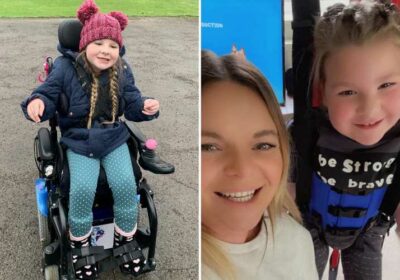My baby girl was brain damaged by common infection in childbirth – when docs failed to treat me

A BABY girl was left brain damaged by a common infection in childbirth, after medics didn't give her mum antibiotics in labour.
Danielle Evans tested positive for Group B Streptococcus when she was 35 weeks pregnant.
It is a common bacteria which lives in the vagina or rectum in men and women, and is generally harmless.
But it can be fatal for babies if it is transmitted in the birth canal, so to prevent this antibiotics are administered during labour to protect them.
But when Danielle, from Cheltenham, Glos., went into labour with baby Aurelia three weeks after being diagnosed, on September 12, she was not given any treatment.
The next day, little Aurelia's condition began deteriorating.
On September 14, at two days old, she was diagnosed with sepsis and probable meningitis caused by Group B Strep. She was subsequently found to have a brain injury.
Now five years old, Aurelia needs full-time care as she cannot walk, suffers from bladder and bowel problems and needs a specialist feeding team.
Danielle, now 32, said: "When I was told that Aurelia had suffered brain damage, I was devastated.
"I had done everything right during my pregnancy and it wasn't something that I even gave a second thought to as everything had been fine until then.
"I then found out it could have been prevented if I had been given antibiotics during labour.
"It made me so angry and upset that had something so simple been carried out, my baby's life could have been totally different.
"While there is nothing I can do to change what happened, I hope that by sharing my story it will make others aware of how dangerous Group B Strep can be."
Gloucestershire Hospitals NHS Foundation Trust admitted liability for Aurelia's brain injury after failing to administer the antibiotics.
It also accepted responsibility for "the entirety of Aurelia's injury as a consequence of her developing meningitis after her birth".
The Trust has apologised, and is working with medical negligence experts Irwin Mitchell, who Danielle brought in, to reach a settlement for the family.
What is Group B Strep?
Group B Streptococcus, or GBS is not uncommon in adults and affects between 20 and 40 per cent of us.
It typically lives in the rectum or vagina, but it is usually harmless and undetectable.
It only gets complicated when it affects a certain group of people, which are:
- Elderly people, or those who are very ill as it can cause repeated or serious infections
- Pregnant women as it could spread to their baby
- Young babies as it can make this incredibly ill.
Symptoms in babies include:
- fever
- breathing problems/grunting sounds
- bluish-coloured skin (cyanosis)
- seizures
- limpness or stiffness
- heart rate and blood pressure abnormalities
- poor feeding
- vomiting
- diarrhoea
- fussiness
If adults develop invasive GBS they will experience:
- bloodstream infection (sepsis)
- skin and soft-tissue infection
- bone and joint infection
- lung infection (pneumonia)
- urinary tract infection
- and, rarely, an infection of the fluid and lining tissues surrounding the brain (meningitis)
The mum added: "All I want now is for Aurelia to have the same opportunities as other children her age.
"My main aim at the minute is to get us into a more suitable house where she can have enough space to move around with her equipment more easily.
"As she gets older, I have no doubt we will face other challenges, but my daughter is my number one priority and I'm determined to help her get the best out of life."
Aurelia started school in September 2020, but regularly sees a physiotherapist and an occupational therapist.
She uses a wheelchair, a standing frame and a Tom Cat Trike to get about.
Laura Daly, specialist medical negligence lawyer at Irwin Mitchell, said: "The past five years have been incredibly difficult for Danielle.
"She has had to come to terms with what happened and what the future holds for Aurelia.
"Group B Strep is a serious bacterial infection but with early diagnosis and treatment, devastating injuries to newborn babies can be prevented.
"In Danielle's case, the hospital trust has admitted a failure in her care by not providing her with antibiotics during labour.
"While we welcome this admission it's vital that lessons are now learned to stop others from suffering in the same way Danielle and Aurelia have.
"In the meantime, we'll continue to support them by ensuring they have access to the care and therapies required to move forward with their lives."
The Sun Online has approached Gloucestershire Hospitals NHS Foundation Trust for comment.
Source: Read Full Article




